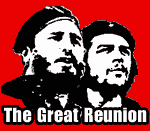After Fidel
 Fidel Castro's health - or lack thereof - is officially a "state secret," Cuban government officials say, leading one to conclude that the tropical generalissimo is not doing very well.
Fidel Castro's health - or lack thereof - is officially a "state secret," Cuban government officials say, leading one to conclude that the tropical generalissimo is not doing very well.Even if the New York Times tells us in a front-page headline that Fidel's condition is "stable."
Brother Raul is in the comandante's chair, as has been the transition plan since 1959. "I do it not because he is my brother - the whole world knows how much we hate nepotism - but because on my honor I consider him to have sufficient qualities to replace me tomorrow in case I die in this struggle," Fidel said the month he took power.
The Castro brothers made sure that all the others with sufficient qualities, such as General Arnaldo Ochoa Sanchez found their lives ended prematurely.
This brings us to a key point about the anticipated post-Fidel transition, a point that nearly all the media coverage of Raul manages to miss.
In addition to controlling the military, the intelligence services, other state entities, and an empire of hard currency business operations, Raul Castro controls the ruthless East German-trained secret police. And with it, he dominates what passes for a judicial system on the island.
No post-Fidel government can be legitimate with such Stasi-like machinery (and personnel) in place.
Any transition plan for Cuba must confront the legacy of the secret police: how to undermine it, how to break it up, and what to do with the archives and informant networks.
Those working Cuba should take lessons from the Soviet and East European transitions. The Czech Republic, Estonia and the former East Germany offer some of the best examples. Russia and Nicaragua offer the worst.
For in-depth discussion of historical examples, see Dismantling Tyranny: Transitioning Beyond Totalitarian Regimes the book that Ilan Berman and I edited at the American Foreign Policy Council.
Without uprooting the secret police system immediately, any transition will take decades.
["The Great Reunion" graphic courtesy of PeoplesCube.com.]


0 Comments:
Post a Comment
<< Home